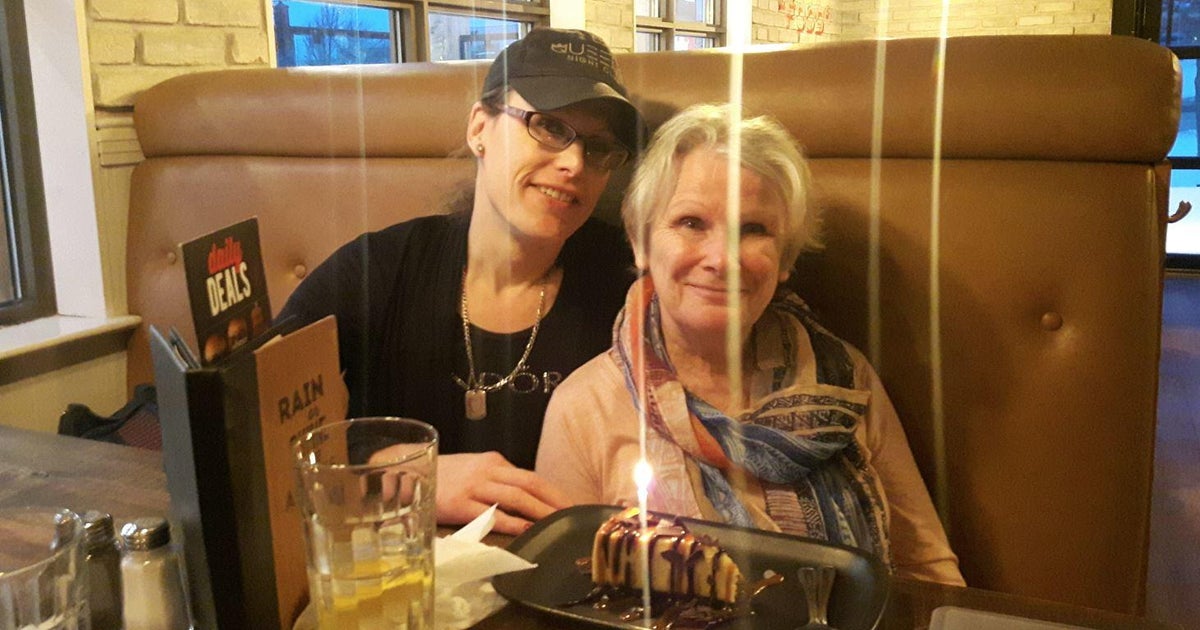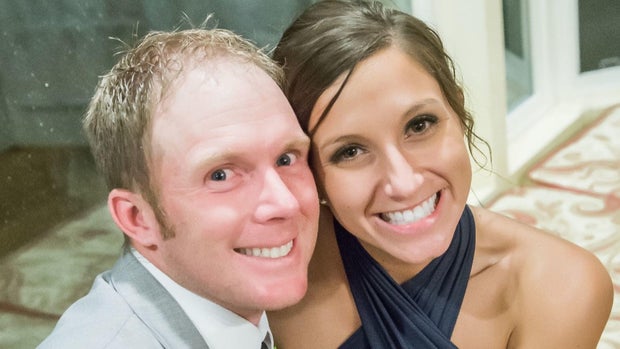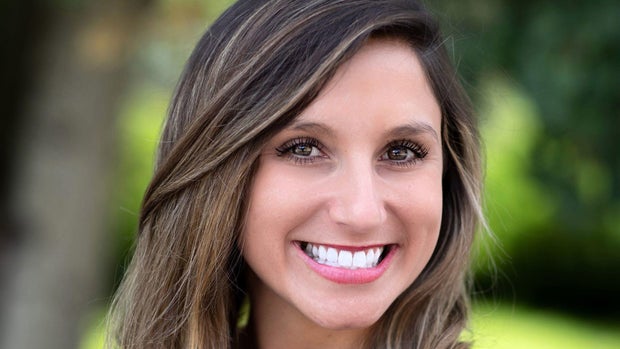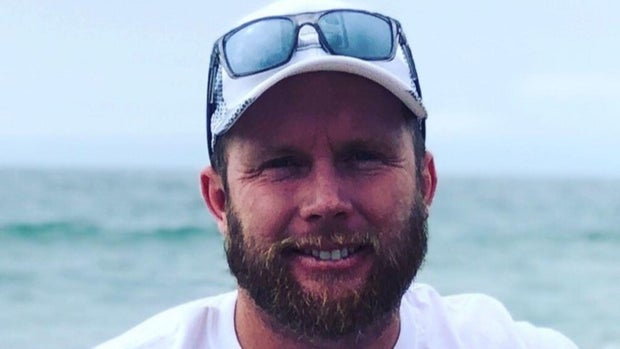CBS News
Did Utah mom Kouri Richins poison her husband, then write a children’s book on coping with grief?

Friends and family expressed shock and disbelief when https://www.cbsnews.com/news/kouri-richins-accused-fatal-poisoning-husband-profit-from-death-lawsuit/Kouri Richins was arrested in connection with the death of her husband, Eric, at their home in Kamas, Utah, in 2022.
“I was shocked,” said her mother Lisa Darden, remembering when she heard the news. “She can’t be arrested.” Darden believed that Kouri and Eric had a great relationship, though there were sometimes bumps in the road. Ronney Darden, Kouri’s brother, said that at the time of Eric’s death, “They were in probably one of the best spots I’ve ever seen them, um, in quite some time.” A year after Eric’s death, Kouri wrote a children’s book to help her sons cope with the loss of their father, and the family, Lisa says, was on their way to healing. Just two months later Kouri was charged in his death.
What is the real story of Eric and Kouri’s marriage – a marriage that would end in tragedy? It begins at their wedding, in June of 2013.
June 15, 2013: A wedding and a pre-nup
Skye Lazaro
On June 15, 2013, Kouri Darden, 23, and Eric Richins, 31, got married in the backyard at their home in Utah. They already had one son, and their family would soon grow.
According to court documents, the couple signed a prenuptial agreement that day, establishing that each party did not have rights to one another’s “present or future income, property, or assets” — except if Eric died while the two were lawfully married. At that point, his stone masonry business, C&E Masonry, would transfer to Kouri.
April 2019: Kouri Richins starts her real estate business
Skye Lazaro
Kouri started her real estate business, K Richins Realty LLC, in 2019. She began to buy homes, fix them up, and sell them for profit. As the business picked up, according to Kouri’s family, Kouri would typically be working on three houses at a time.
“That was what she loved doing,” said Kouri’s friend and marketing director Greg Hall. “Kouri was very successful at what she did.”
The spokesman for Eric’s family, Greg Skordas, told “48 Hours” something different. He says Kouri was not so savvy, and court documents allege that by 2022, Kouri’s business was drowning in millions of dollars of debt.
March-June 2019: “Stolen” funds
Prosecutors allege that in 2019, Kouri began stealing from Eric’s accounts and “misappropriating monies distributed from Eric Richins’ business.” Court documents claim that “without Eric Richins’ knowledge or permission,” Kouri used a “fraudulent” Power of Attorney to execute a $250,000 credit deed of trust on the family home, then withdrew the entire $250,000 from this home equity line of credit.
Kouri’s family insists that Kouri did not steal from Eric, and that Eric was always aware of the family’s finances. “Eric and Kouri sat down every month and did the bills together,” says Lisa Darden. “At all times, Eric knew what was going in and what was coming out.”
November 2020: The Eric Richins Living Trust
Skye Lazaro
Prosecutors say that in late 2020 Eric discovered Kouri had misappropriated his funds. Kouri’s family disputes this claim. However, in November, Eric did meet with an estate planning lawyer, Kristal Bowman-Carter, to make a new estate plan. He created the Eric Richins Living Trust and named his sister, Katie Richins-Benson, trustee. In the case of his death, Katie – not Kouri – would manage his estate.
Bowman-Carter said in a statement filed with the court: “[Eric] told me he had two primary goals. His first goal was to protect him in the short-term from fairly recently discovered and ongoing abuse and misuse of his finances by his wife Kouri Richins. His second was to protect the three young sons he and Kouri had together in the long-term by ensuring that Kouri would never be in a position to manage his property after his death.”
Kouri was not informed about the trust and wouldn’t find out about it until after Eric died.
Early 2022: Kouri Richins allegedly asks for drugs
Prosecutors allege that in early 2022 Kouri Richins asked her housekeeper, referred to in court filings as “C.L.,” to procure fentanyl for her. Court documents say C.L. told investigators she sold fentanyl to Kouri. Court documents also say that phone records show that texts between Kouri and C.L. from January 2 until shortly after Eric’s death were deleted off of Kouri’s phone.
Defense attorney Skye Lazaro says the evidence isn’t strong enough to prove Kouri ever bought drugs. She says there are no witnesses to confirm what C.L. says, and that C.L., who is a convicted felon, is not credible.
When C.L. spoke to investigators, she “was on probation at the time,” Lazaro said. “I think anytime you have an informant-type situation with promises made… by, you know, law enforcement or prosecutors, it can call into question the veracity of their statements.”
Feb. 14, 2022: A Valentine’s Day poisoning?
Skye Lazaro
Prosecutors say that on Valentine’s Day, 2022, shortly after Kouri gave Eric a sandwich, he broke out in hives and had difficulty breathing. He used his son’s EpiPen and slept. According to the charging document, Eric believed that he had been poisoned, and told a friend that he thought his wife was trying to poison him.
Kouri’s defense denies this version of events in court documents. Documents say Kouri purchased lunch for herself and Eric that day, and that he was simply not feeling well after lunch and went to take a nap. Kouri’s lawyer, Skye Lazaro, says that aside from an assertion from the family, there is no evidence to corroborate the claim that Eric was poisoned.
Late February 2022: “Some of the Michael Jackson stuff”
Court documents describe a second alleged transaction between Kouri and her housekeeper, C.L., that took place in late February 2022. According to those documents, C.L. told investigators that Kouri said that the fentanyl pills C.L. previously provided were not strong enough and that Kouri asked for “some of the Michael Jackson stuff.”
Documents say C.L. later conceded that Kouri may have made the Michael Jackson reference during the first request for fentanyl. Skye Lazaro insists that Kouri never made any such reference and never bought drugs from C.L., and that C.L’s stories are inconsistent and unreliable.
“48 Hours” reached out to C.L. for comment, but she did not respond.
March 4, 2022: A tragic death
Skye Lazaro
Summit County Sheriff’s deputies and EMS staff arrived at the Richins’ home in Kamas, Utah, at 3:31 a.m. on March 4. They found Eric Richins deceased. According to court documents, the responding paramedic thought “he’d been dead a while.”
Documents say that at the scene, Kouri told investigators she’d made her husband a cocktail before bed then went to sleep with her son who was having nightmares. She said that when she returned to Eric’s side at around 3 a.m., he was unresponsive, and she called 911.
Eric’s family’s spokesperson, Greg Skordas, describes Eric’s death as “a huge loss … he was this beautiful son and – and brother, and father, and cared about people … cared about everything he was doing.”
March 5, 2022: The $3.9 million mansion
CBS News
The day after Eric’s death, Kouri Richins closed on a big purchase she’d made for her house flipping business: this $3.9 million, 20,000 square foot mansion in Heber City, Utah. Kouri’s family says Eric was on board with the plan to fix up the house and sell it for a large profit.
“[Kouri] and Eric sat down with an accountant one time,” Lisa Darden told “48 Hours,” “and he said, if you can get it done and stay under budget, you could walk away with $12 million.”
But according to a search warrant, Eric’s family told investigators that Eric was not happy with the purchase, and that he Kouri were arguing about the property before his death.
“He was on board with supporting his wife,” family spokesman Greg Skordas said. “That doesn’t mean he agreed with it.”
March 6, 2022: A fight breaks out
CBS News
Two days after Eric’s death, court documents allege, Kouri Richins and Eric’s sister Amy fought at the family home. Prosecutors say Kouri called a locksmith to attempt to access a safe in the house, and Amy objected. Amy allegedly told Kouri that Eric’s property, under the trust, did not belong to Kouri, and Kouri “became enraged” and “punched Amy in the face and neck.”
“I was standing in the middle of them,” says Kouri’s brother DJ. “All they did was push. Both of them were trying to swing over the top of me … so the narrative that’s been pushed that it was, poor Amy got assaulted was nonsense.”
Kouri was charged with assault and later pleaded no contest.
April 2022: Five times the lethal dose
According to court documents, following an autopsy in April 2022 it was determined that Eric had died from an overdose of fentanyl. The medical examiner said that Eric had 15 ng/mL of fentanyl in his blood — and that in other deaths caused by fentanyl, concentrations have been reported as low as 3 ng/mL. This data indicates that the amount of fentanyl Eric ingested was five times the lethal dose.
March 7, 2023: A book to cope with grief
Kouri’s family says that after Eric’s death, Kouri and her sons were grieving. “The boys … lashed out a little bit because they couldn’t quite understand what was going on,” says Kouri’s brother Ronney. “They needed some help and Kouri needed some help.”
Amazon
To help her sons cope with their grief, according to Kouri and her family, Kouri wrote a children’s book, “Are You With Me?” On March 7, 2023, she self-published the book, which she sold on Amazon. It follows the story of a child who lost his father but is reminded his presence still exists all around. Kouri’s family says it helped her and the boys, and they were on their way to healing.
In April 2022 Kouri promoted the book on a local TV show called “Good Things Utah.” Just a month later, she was arrested for Eric’s murder.
May 8, 2023: Kouri Richins arrested
On May 8, 2023, Kouri Richins was arrested and charged in her husband’s murder. Prosecutors allege that when Kouri made Eric that drink just hours before he died, she deliberately poisoned him with fentanyl she purchased from C.L. She was charged with one first degree felony count of criminal homicide, aggravated murder and three second-degree felony counts involving possession of a controlled substance with intent to distribute.
Kouri maintains her innocence. Her family says they suspect that Eric accidentally took something – perhaps a THC gummy, which they say he was known to take – that he didn’t know was laced with fentanyl, and that his death was a tragic accident.
“[The State is] gonna have to prove that she did this, that she got the drugs and that she somehow gave them to him,” Kouri’s attorney Skye Lazaro told “48 Hours.” “And unless they can connect those dots, they’re gonna have a hard time proving murder in this case.”
June 12, 2023: Kouri Richins fights for bail
AP Newsroom
On June 12, 2023, Kouri Richins appeared publicly in court for the first time to argue for release on bail. Her attorney was hopeful: in order to deny Kouri bail, the state would have to prove substantial evidence existed in the case against her. In the four-hour hearing, prosecutors presented evidence and called several witnesses, including Chris Kotodrimos, a cellphone analyst, and Detective Jeff O’Driscoll, the lead detective on the case.
One of the things analyst Kotodrimos talked about was a report of the Google searches Kouri made in the year after Eric died. The searches include “can FBI find deleted messages” and “what is a lethal dose of fentanyl?” In her cross examination, defense attorney Skye Lazaro pointed out the timing of the Google searches, emphasizing that they were made after Eric Richins’ death. She says they were innocent questions Kouri had about what she was being accused of in this case.
When Detective O’Driscoll took the stand, he told the court about interviews he conducted with C.L. He said C,L. told him the dates and times that Kouri allegedly purchased fentanyl from her. Lazaro maintains that C.L. – who is a convicted felon – is not a credible witness, and that the state does not have the evidence to prove that C.L. ever sold Kouri anything. In her cross-examination, she asked the detective if there were any texts from Kouri or witnesses to corroborate C.L.’s story, and he replied that investigators had not found any.
At the conclusion of the hearing, the judge denied Kouri Richins’ request for bail. She will remain in custody until her trial.
Nov. 3, 2023: Accusations of witness tampering
This unsent letter, found in Kouri’s jail cell, has become known as the “walk the dog” letter for the words scrawled at the top of the page. Its contents have become a point of controversy in the case. Prosecutors argued it’s evidence that Kouri was involved in witness tampering.
Summit County Court
In the letter, prosecutors alleged, Kouri writes to her mother and gives her instructions on what her brother, Ronney, should say in court. She writes that her defense case needs “some kind of connection” between Eric and drugs. She says, “Here is what I’m thinking but you have to talk to Ronney. He would probably have to testify to this, but it’s super short not a lot to it.” She appears to tell her mother to tell Ronney to recount a story where “Eric told Ronney he gets pain pills & fentanyl from Mexico”.
On Nov. 3, 2023, prosecutors brought to court a motion for no contact, asking the judge to restrict Kouri’s communication with her mother and brother Ronney.
Kouri’s attorney, Skye Lazaro, argued that the letter wasn’t witness tampering. “It isn’t witness tampering,” she told “48 Hours,” “… ’cause it didn’t go anywhere and it was never communicated to anyone.” She says the document was private and should never have been released. The judge denied the state’s motion, saying prosecutors had failed to prove witness tampering.
TBD: Kouri Richins trial
Skye Lazaro
A date has not yet been set for Kouri Richins’ trial in the death of her husband, but her attorney expects the case will go before a jury in 2025. Until then, all both families can do is wait and hope for a verdict that delivers their version of justice.
CBS News
As Canada delays medically assisted dying in mental illness cases, some find relief, others fear consequences

When Savannah Meadows had lunch last October with her mother, Sharon Turcott, Meadows was “all smiles,” the mother told CBS News.
“Maybe she’s turned a corner,” Turcott recalled thinking about her daughter, who had been struggling with serious mental illness.
The next morning, she received a scheduled email: “Mom, if you’re reading this, I’m probably on my way to heaven,” it said. Her daughter had taken her own life at the age of 44.
Sharon Turcott
“She did not want to die by suicide. She did not want to die alone,” Turcott said.
Instead, Meadows had been seeking a medically assisted death — something Canada legalized in 2016. It had been set to expand last year to patients who were suffering solely from mental illness, but that expansion was delayed, and Meadows ultimately died by suicide.
The delay has been welcomed by some, but condemned by others.
The history of Canada’s, still evolving MAID law
In 2016, Canada enacted a law allowing medical assistance in dying, known as MAID, for people whose natural death is reasonably foreseeable. Under the law, following a process establishing that all eligibility criteria have been met, a physician or nurse either directly administers a substance that induces death or prescribes a drug that the person takes themselves.
Five years later, the law was expanded, no longer requiring a person’s death to be reasonably foreseeable as an eligibility criterion for adults with a grievous and irremediable medical condition. Under the changes, individuals suffering solely from mental illness were temporarily excluded for eligibility until March 2023.
Meadows, described by her mother as a proud trans woman, had picked a date and began preparations for the end of her life.
“It gave me time to accept the fact that my daughter was going to die,” Turcott said.
A few days before Meadows would potentially have been eligible to seek a medically assisted death, however, the government announced a yearlong delay for the consideration of cases of mental illness. Seven months later, Meadows died by suicide.
The delayed inclusion of patients seeking MAID on the basis of mental illness has been met with apprehension from the start.
Canada’s Expert Panel on MAID and Mental Illness, established to assist in developing the government’s approach to the expansion of the law, outlined concerns in a 2022 report, including the daunting task for clinicians asked to make predictions about individual patients and establish incurability and irreversibility despite the difficulties of predicting the evolution of mental disorders.
Another factor was what the report referred to as structural vulnerability, or the risk of factors such as unstable housing or lack of employment opportunities resulting in individuals viewing death as an only option.
The panel offered a number of recommendations in its report for establishing an expanded MAID regime.
The future of the MAID law’s expansion, however, is also dependent to some degree on domestic politics, which appear set to shift. Pierre Poilievre, whose Conservative Party is up by a significant margin in polls ahead of national elections set to take place within a year, has vowed to “revoke entirely” the expansion of the law to include solely mental health cases, arguing that it blurred a line “between suicide prevention and suicide assistance.”
“She would have died the way she wanted to.”
Since her daughter’s death, meanwhile, Turcott has become an advocate for MAID access for those whose sole underlying condition is mental illness.
“She would have died the way she wanted to, and because that’s what she wanted, that would have been fine with me,” Turcott said. “Suicide was not fine with me.”
Sharon Turcott
In February, the government further postponed MAID eligibility for patients whose sole condition is mental illness until March 2027 — four years after it was initially slated to go into effect.
Mark Holland, Canada’s Minister of Health, said that while “significant progress has been made in supporting practitioners in assessing MAID eligibility in complex cases,” the country’s health system was “not yet ready for MAID where the sole underlying condition is mental illness.”
The delay has been condemned by some MAID advocates. Dying With Dignity Canada, an organization that advocates for end-of-life rights, filed a lawsuit in August alleging discriminatory exclusion in the law against people with mental illness.
An ongoing debate over access to MAID
Others, however, view the delay as a step to ensure necessary safeguards are in place and health care providers are prepared to handle relevant cases. The Canada Mental Health Association said in a January statement that it supported the postponement, citing what it called insufficient time and resources allocated to ensure that people with mental illnesses can access the necessary care.
Some groups oppose the law’s expansion outright. In September, Inclusion Canada, a nonprofit group that advocates for Canadians with intellectual disabilities, filed a lawsuit challenging MAID for people with a disability who are not dying or whose death is not “reasonably foreseeable.”
The lawsuit argues that MAID Track 2, the 2021 expansion of the law to include patients whose deaths are not reasonably foreseeable, had already resulted in premature deaths.
“People are dying. We are witnessing an alarming trend where people with disabilities are seeking assisted suicide due to social deprivation, poverty and lack of essential supports,” Krista Carr, executive vice-president of Inclusion Canada, said in September.
Compounding CMHA and Inclusion Canada’s concerns, an expert committee of professionals from disciplines including ethics, social work and medicine that reviewed MAID deaths in Ontario identified cases in which it said isolation and unmet social needs, such as housing, had fueled several euthanasia recipient’s requests.
The committee also found that patients seeking eligibility under the expanded Track 2 criteria were about 8% more likely to reside in areas of the province with high levels of social marginalization than MAID Track 1 recipients.
The committee’s report acknowledged that while the deaths discussed were not necessarily representative of frequent reasons for accessing MAID Track 2, or even the majority of MAID Track 2 deaths, the themes identified were “not uncommon within the MAID review process.”
Out of 4,644 medically assisted deaths carried out during 2023 under Canada’s MAID law, only 116 deaths were Track 2 patients, according to the committee.
But the report’s findings don’t resonate with everyone, and opposition to the law’s proposed inclusion of patients who suffer from only mental illness has been deeply frustrating for some people seeking MAID.
Jason, a Toronto resident who didn’t want to be fully identified over concerns that his future MAID review process could be affected, is one of those people.
“When I first heard that it was delayed, my world came crashing down,” he said.
Jason told CBS News that he’s struggled with depression, anxiety and panic attacks for decades, and has attempted suicide twice. He said he’s tried inpatient programs, medication, electroconvulsive therapy and ketamine treatment, among other remedies, to little avail.
“I would not be alive today if there wasn’t the possibility of MAID going through in 2027,” he said, saying the chance of MAID’s expansion was the only reason he hadn’t attempted suicide a third time.
The current safeguards for those seeking MAID whose death is not reasonably foreseeable include two independent practitioners — one of whom must have expertise in the condition affecting the patient — confirming that all eligibility criteria are met, a minimum period of 90 days for eligibility assessments to be made, and the opportunity for the patient to withdraw consent at any point up until the procedure is carried out.
The patient must also be informed of counseling and palliative care options, support for disabilities and mental health, and be offered consultation with relevant professionals in addition to having discussed with their practitioner “reasonable and available means to relieve the person’s suffering, and agree [with the practitioner] that the person has seriously considered these means.”
In a poll conducted in 2023 by Dying with Dignity Canada, 78% of respondents said they supported the removal of the “reasonably foreseeable” natural death requirement from the MAID law, indicating strong support for the Track 2 expansion. But a 2017 survey gauging the attitudes of Canadian psychiatrists toward medical assistance in death found only a minority of 29.4% supported MAID on the basis of mental illness alone, compared to 71.8% who said other factors should also be present to determine eligibility.
Jason said he understood some doctors’ opposition to MAID for mental illness.
“Doctors are there to make you better,” he said. But he added that as mental illness isn’t something that “shows up on a screen,” it can be difficult for people without direct experience to understand the extent of someone else’s pain.
“I don’t have the physical pain that someone else has, but the psychological pain is just as bad,” he said.
In 2022, MAID deaths accounted for 4.1% of overall deaths in Canada, with the average age of MAID patients being 77, according to Canada’s fourth and most recent annual report on Medical Assistance in Dying. Since the law was introduced in 2016 there have been a total of 44,958 medically assisted deaths in the country.
Jason said he didn’t want to put his family through the trauma of another suicide attempt, and that his brother and mother were helping him explore options abroad. Those options, especially for people suffering mental illness, are limited, and often complicated by varying domestic laws around the world.
Jason said that, like Turcott, his own mother is supportive of his choice to seek MAID.
“As much as she doesn’t want me to do this again, she would rather I die properly with the assistance of a doctor than have it done by suicide,” he said.
Turcott said she was concerned that the postponement of MAID on the basis of mental health would result in more suicides, leaving families to mourn unexpectedly.
“I don’t want anybody to experience the loss of their child through suicide, and their child being so desperate that they saw no other choice but to take their life,” she said.
CBS News
What is a bomb cyclone?

Watch CBS News
Be the first to know
Get browser notifications for breaking news, live events, and exclusive reporting.
CBS News
Will enrolling in a credit card debt management program hurt your credit?

Getty Images
With average credit card interest rates recently surpassing 23% and retail credit card rates sitting above 30% on average, many Americans have found themselves trapped in a cycle of minimum payments and mounting balances. That can be a tough road to navigate in any economic environment, but in today’s landscape, where prices on essentials continue to climb and household budgets remain stretched, it can be even more difficult to conquer. As a result, more cardholders are maxing out their credit cards and becoming delinquent on their credit card payments.
Late payments and maxed-out credit cards can have a real impact on your credit and your financial health, so if you’re facing this issue, it’s important to find ways to get relief. Fortunately, there are many potential debt relief strategies to consider, including credit card debt management programs. These programs were created to help cardholders consolidate multiple credit card payments into a single monthly payment while potentially securing lower interest rates and fees. The appeal is obvious: simplified payments, reduced rates and a clear path to becoming debt-free.
However, some cardholders may be hesitant to enroll in one of these programs due to concerns about the impact it could have on their credit. But will enrolling in a credit card debt management program actually hurt your credit? The answer isn’t entirely straightforward.
Explore the debt relief options available to you now.
Will enrolling in a credit card debt management program hurt your credit?
Enrolling in a debt management program can have both positive and negative effects on your credit score. One of the immediate impacts is that your creditors may add a notation to your credit report indicating that you are participating in a debt management program. While this notation itself doesn’t lower your score, it could raise red flags for lenders, as it signals that you’re receiving help to manage your debts.
Another consideration is how the program affects your credit utilization ratio and credit age. Your creditors will likely close your credit card accounts when you enter the program. This action can negatively impact your credit score in two ways. First, it reduces your available credit, which increases your credit utilization ratio. Second, it can slightly shorten your average credit age if these are long-standing accounts, which could lower your score temporarily.
However, the program’s positive effects often outweigh these initial setbacks. As you make consistent payments through the program, your payment history – which accounts for 35% of your FICO score – strengthens. As your balances decrease, your credit utilization also improves, positively impacting another 30% of your score.
It’s also worth noting that debt management programs don’t carry the same negative credit implications as more drastic measures like bankruptcy or debt settlement. While your credit report will show that you’re paying through a debt management program, this notation itself doesn’t factor into your credit score calculations.
So, the short answer is that ultimately, the effect a debt management plan has on your credit depends heavily on your starting point. If your credit score is already suffering due to late payments or high balances, a debt management program may help stabilize and eventually improve your credit over time. If your score is in good shape but you’re struggling with mounting debt, the short-term impact of closing accounts and creditor notations might bring a noticeable dip in your score.
Tackle your expensive credit card debt today.
What other credit card debt relief options are worth considering?
Debt management programs are just one tool in the debt relief toolbox. Depending on your financial situation, you might want to consider these other alternatives:
- Debt consolidation: With debt consolidation, you take out a single loan to pay off all your credit card balances. This simplifies your payments and can lower your interest rate if you qualify for a competitive loan. However, you’ll need good credit to access the best rates.
- Balance transfer: If you have a solid credit score, a balance transfer card with an introductory 0% APR period can help you save on interest and pay down debt faster. Just be cautious of transfer fees and ensure you can pay off the balance before the promotional period ends.
- Debt settlement: You can contact your creditors, either with the help of a debt relief company or on your own, to try and negotiate a settlement for less than you owe. While this requires negotiation skills, it’s a more direct approach that can yield favorable results.
- Bankruptcy: If you’re facing overwhelming debt with no feasible way to repay it, bankruptcy may provide a clean slate. However, it comes with significant long-term consequences for your credit and should be a last resort.
The bottom line
Enrolling in a credit card debt management program can impact your credit in both positive and negative ways. While the immediate effects — such as account closures and creditor notations — might cause a temporary dip in your score, the long-term benefits of consistent payments and reduced interest rates can outweigh these drawbacks. For many, the opportunity to regain control over their finances and work toward becoming debt-free is worth the trade-off.





















